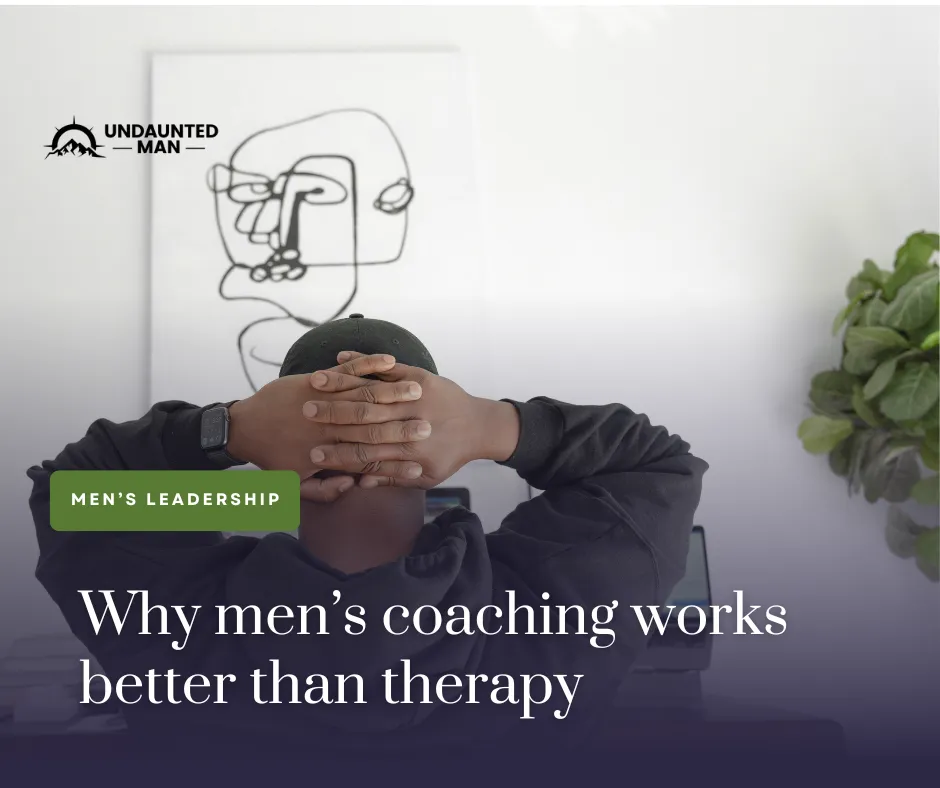
Why men's coaching works better than therapy
The Challenges of Therapy for Men — And Why Coaching Can Work Better
Therapy is often considered the gold standard for personal growth and emotional healing. But for many men, traditional talk therapy doesn’t deliver the results they’re looking for. It’s not because men don’t need help or don’t want to grow; it’s because the way therapy is structured often doesn’t align with how masculine minds process, connect, and change.
In this article, we’ll explore why therapy can be a poor fit for many men, the differences in masculine and feminine communication styles, and why men’s coaching and men’s work can provide a better path toward transformation.
1. Therapy Was Built for a Feminine Communication Style
Most traditional therapy models were developed with a feminine mode of communication in mind — face-to-face, verbal processing, and emotional co-regulation. Women tend to process their feelings and emotions by talking through them in conversation.
Men, on the other hand, often process best shoulder-to-shoulder, while doing something together. That could mean walking, hiking, working on a project, or engaging in a shared challenge. These activities allow men to connect and reflect without the pressure of constant eye contact or direct verbal probing.
When therapy ignores these differences, men can feel like they’re being forced into a way of processing that simply doesn’t fit them.
2. Men Live in Their Heads — and Need More Than Talk
Masculine-dominant people often spend a lot of time in their heads. Sitting in an office talking for 60 minutes can reinforce overthinking instead of breaking it. Without an experiential or action-based element, therapy can keep men trapped in mental loops.
This is where men’s coaching differs; it ties emotional processing to action. Coaching challenges men to take steps, build skills, and engage in real-world changes, which is often a more natural and effective path to growth for the masculine mindset.
3. The Gender Imbalance in Therapy
Another factor? The majority of therapists are women. While many are excellent, the field as a whole has largely lost the cultural knowledge of how men work, communicate, and heal. Too often, the default assumption is that men should learn to process emotions the same way women do, and if they don’t, they’re labeled emotionally unavailable or broken.
But men are not defective women — their way of processing emotions is different, not wrong. Effective help for men honors those differences instead of trying to erase them.
4. Why Men’s Coaching Works
The best men's coaching is:
Action-oriented — tied to real-world challenges and goals.
Experiential — movement, shared experiences, and skill-building.
Respectful of masculine processing — integrating emotion without forcing a feminine framework.
Focused on leadership — helping men step into responsibility, purpose, and integrity.
Men helping men in a coaching environment also provides a rare space where men can be authentic without judgment, connecting shoulder-to-shoulder with other men who are committed to growth.
5. The Relationship Factor
Many men seek therapy because of relationship struggles, often feeling they’re “not enough” for their partners, despite working hard and taking responsibility. Modern relationship dynamics can unintentionally create double standards, with men expected to adapt to feminine communication styles while women are rarely encouraged to understand masculine ones.
Great coaching for men doesn’t vilify the feminine — instead, it teaches men and women to be bilingual in each other’s styles, knowing when to bring logic and when to bring emotion, and how to lead with presence.
6. Moving Beyond Scorekeeping
One of the most destructive dynamics in relationships is scorekeeping — tallying who has done what and using it as a metric of worthiness. This quickly leads to resentment and contempt, which relationship researchers like The Gottmans identify as a top predictor of divorce.
Men’s work helps men drop scorekeeping by focusing on service, leadership, and self-responsibility, not from a place of weakness, but from a place of strength and clarity.
The Takeaway: Men Need Support That Fits How They’re Wired
If you’re a man who’s tried therapy and found it lacking, you’re not broken — you may just need a different approach. Our men's groups offer tools, structure, and brotherhood designed for how men actually process and grow.
At The Undaunted Man, we help men step into their full masculine power without apology — integrating emotional depth with decisive action. Whether it’s through our group coaching, retreats, or leadership work, we create spaces where men thrive.
Ready to get started?
📖 Download our guide, Solving The Masculine Dilemma
💬 Join one of our coaching groups
🗻 Apply for our Silent Summit retreat
Learn more at theundauntedman.com
![Mark Johnson is a men’s leadership coach, writer, and speaker dedicated to helping modern men cultivate resilience, emotional self-mastery, and purpose-driven leadership. With a background in [mention relevant experience, e.g., psychology, coaching, or leadership], he challenges the outdated narratives of masculinity and empowers men to lead with confidence, clarity, and authenticity. Through The Undaunted Man, Mark provides actionable insights on self-sufficiency, mindset, and forging your own path in today’s world. Follow his work and join the conversation on https://theundauntedman.com/](https://storage.googleapis.com/msgsndr/NBQ2dT8HqYY59fq9YCQx/media/674f4934d8377380acbe2205.png)